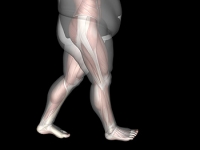 Plantar fasciitis occurs when the connective plantar fascia tissue on the bottom of the foot becomes inflamed, or even torn, from overuse. Women, runners, people who are obese or who stand while working, are more at risk of developing plantar fasciitis. Also, having certain structural issues—such as flat feet, high arches, or tight calf muscles—can cause the plantar fascia to pull away from the heel while it is bearing weight, and may lead to this condition. Plantar fasciitis can be very painful, especially when you take your first steps in the morning, thereby engaging the plantar fascia after a long period of inactivity. Icing, stretching, anti-inflammatory medications and injections, casting, splinting, and other conservative treatments administered by a podiatrist can usually repair the plantar fascia without the need for surgery. It is suggested to make an appointment with a podiatrist to have your condition diagnosed and treated properly.
Plantar fasciitis occurs when the connective plantar fascia tissue on the bottom of the foot becomes inflamed, or even torn, from overuse. Women, runners, people who are obese or who stand while working, are more at risk of developing plantar fasciitis. Also, having certain structural issues—such as flat feet, high arches, or tight calf muscles—can cause the plantar fascia to pull away from the heel while it is bearing weight, and may lead to this condition. Plantar fasciitis can be very painful, especially when you take your first steps in the morning, thereby engaging the plantar fascia after a long period of inactivity. Icing, stretching, anti-inflammatory medications and injections, casting, splinting, and other conservative treatments administered by a podiatrist can usually repair the plantar fascia without the need for surgery. It is suggested to make an appointment with a podiatrist to have your condition diagnosed and treated properly.
Plantar fasciitis can be very painful and inconvenient. If you are experiencing heel pain or symptoms of plantar fasciitis, contact Brent Harwood, DPM from Southeast Podiatry. Our doctor can provide the care you need to keep you pain-free and on your feet.
What Is Plantar Fasciitis?
Plantar fasciitis is the inflammation of the thick band of tissue that runs along the bottom of your foot, known as the plantar fascia, and causes mild to severe heel pain.
What Causes Plantar Fasciitis?
- Excessive running
- Non-supportive shoes
- Overpronation
- Repeated stretching and tearing of the plantar fascia
How Can It Be Treated?
- Conservative measures – anti-inflammatories, ice packs, stretching exercises, physical therapy, orthotic devices
- Shockwave therapy – sound waves are sent to the affected area to facilitate healing and are usually used for chronic cases of plantar fasciitis
- Surgery – usually only used as a last resort when all else fails. The plantar fascia can be surgically detached from the heel
While very treatable, plantar fasciitis is definitely not something that should be ignored. Especially in severe cases, speaking to your doctor right away is highly recommended to avoid complications and severe heel pain. Your podiatrist can work with you to provide the appropriate treatment options tailored to your condition.
If you have any questions please feel free to contact our our offices located in Fairhope, Brewton, and Atmore, AL. We offer the newest diagnostic and treatment technologies for all your podiatric needs.








